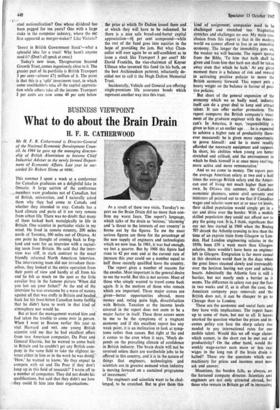What to do about the Brain Drain
BUSINESS VIEWPOINT H. F. R. CATHERWOOD
Mr H. F. R. Catherwood is Director-General of the National Economic Development Coun- cil. In 1964 he gave up the managing director- ship of British Aluminium to become Chief Industrial Adviser to the newly formed Depart- ment of Economic Affairs. Last year he suc- ceeded Sir Robert Shone at NEDC.
This summer I spent a week at a conference for Canadian graduates on a delightful lake in Ontario. A large section of the conference
, r members were graduates not of Canadian, but of British, universities, and I naturally asked them why they. had come to Canada and whether they intended to stay. Canada has a hard climate and parts of it are very remote from urban life. There was no doubt that many of them looked back nostalgically to life in Britain. One scientist in particular sticks in my mind. He lived in remote country, 200 miles north of Toronto, 100 miles out of Ottawa. At one point he thought of coming back to Eng- land and went for an interview with a recruit- ing team from Britain. He said that the inter- view was stiff, in stark contrast to the usual friendly informal North American interview. The interviewing team did not introduce them- selves, they looked at the entire operation from their point of view and hardly at all from his and he felt as much on the spot as the little cavalier boy in the famous picture 'When did you last see your father?' At the end of the interview he was overcome by a wave of nausea against all that was stuffy in Britain and headed., back for his frost-bitten Canadian home feeling that he didn't have to work in that kind of atmosphere nor would he.
But at least the management wanted him and had taken the trouble to come over in person. When I went to Boston earlier this year to visit Harvard and MIT, one young British scientist told me that he had excellent offers from two American companies, Du Pont and General Electric, but be wanted to come back to Britain and he couldn't get any British com- pany in the same field to take the slightest in- terest either in him or in the work he was doing.' `How,' he wanted to know, `do they expect to compete with GE and Du Pont if they don't keep up in this field of research?' I wrote off to a number of companies. They did not doubt his qualifications, but said that they didn't see how
- 'they could fit him into their organisations.
As a result of these two visits, Tuesday's re- port on the Brain Drain did no more than con- firm my worst fears. The report's language, which talks of the drain as `serious,' alarming' and 'a threat to the interests of our country' is borne out by the figures. To me the most serious figures are those for the percentage of the new supply of engineers and technologists which we now lose. In 1961, it was bad enough, we lost a quarter. But by 1966 this figure had risen to 42 per cent and at the current rate of increase this year could see a number equal to half those recently qualified leave the country.
The report gives a number of reasons for the exodus. Most important is the general desire to see the world. But this is not serious. Most of thbse who simply wanted to travel come back again. It is the motives of those who remain which are important. Three major causes are given—better opportunities abroad, more money and, rating quite high, dissatisfaction with Britain. Taxation at the income levels covered in the report does not seem to be a major factor in itself. These three causes seem to me to be the symptoms of a stagnant economy and if this excellent report has any weak point, it is an inclination to look at symp- toms rather than causes. But right at the end it comes to the crux when it says, 'Much de- pends on the prevailing climate of confidence in British industry. The brain drain will not be reversed unless there are worthwhile jobs to be offered in this country, and it is in the nature of things that engineers, technologists and scientists are in greatest demand when industry is moving forward on a sustained programme of investment.'
The engineers and scientists want to be chal- lenged, to be stretched. But to give them this
kind of assignment, companies need to be challenged and stretched too. Stagnation stretches and challenges no one. My main con- clusion from this report is that in the modern world we cannot afford to live in an immobile economy. The longer the immobility goes on, the weaker we will become. The report quotes from the Bible, `To him that hath shall be given and from him that hath not shall be taken away even that which he hath.' At any given moment there is a balance of risk and reward in activating positive policies to move the British economy forward. This report puts a heavy weight on the balance in favour of posi- tive policies.
• But short of the general expansion of the economy which we so badly need, industry itself can do a great deal to keep and attract talent. It can offer earlier promotion. The report compares the British company's treat- ment of the graduate engineer with the Ameri- can's. In America, it says, 'responsibility is given to him at an earlier age ... he is expected to achieve a higher rate of productivity (how- ever measured); he is given more opportunity to prove himself: and he is more readily afforded the necessary equipment and support. In short, his abilities when young are better stretched and utilised, and the environment in which he finds himself is at once more exci'ing, more active and more remunerative.'
And so we come to money. The report puts the average American salary at two and a half times the average British salary and the Ameri- can cost of living not much higher than our own.. In Ottawa this summer, the Canadian economic planners, senior civil servants and ministers all pointed out to me that if Canadian wages and salaries were not at or near us levels, their skilled population would simply get in a car and drive over the border. With a mobile skilled population they could not afford not to pay the going rate. It is, I think, significant that our net loss started in 1960 when the Boeing 707 shrank the Atlantic crossing to less than the time of an express train from Glasgow to Lon- don. Had London engineering salaries in the 1950s been £50 a week more than Glasgow salaries, there wouldn't have been an engineer left in Glasgow. Emigration is far more casual in this shrunken world than in the days when the great liners steamed slowly and irrevocably over the horizon leaving wet eyes and aching hearts. Admittedly the Atlantic fare is still a barrier, but not nearly such a barrier as it seems. The difference in salary can pay the fare in two weeks and if, as is often the case, the American company pays removals and the British does not, it can be cheaper to go to Chicago than to London.
These are the economic and social facts and they have wide implications. The report faces up to some of them, but not to all. It leaves unasked the question whether the prices and in- comes policy can face the sharp salary rise needed to pay international rates for our mobile talent. Would this set off wage claims which cannot, in the short run be met out of productivity? On the other hand, would the weekly wage-earner earn more or less real wages in the long run if the brain drain is halted? These are the questions which our machinery for prices and incomes must now ask and answer.
Meantime, the burden falls, as always, on the harassed company director. Scientists and engineers are not only attracted abroad, but those who remain in Britain go off in increasing
numbers to the shelter of university life and the great government research laboratories. This, he complains, is the drain that matters and this is the drain which should be within our own control. The engineer who is bound by hard commercial discipline gets all the kicks and the prestige goes to those far from the firing line. Yet every time industry tries to widen the salary differentials, up come government and univer- sity salaries, raised by the iron rules of com- parability.
The report suggests that the differential should be widened in favour of industry. But an eminent academic at the last national pro- ductivity conference suggested that that was not enough. People came to him for jobs be- cause industry did not stretch them. Industry must give the engineer and the scientist the challenge and intellectual stimulus for which his training has prepared him. This can be done by careful structuring of company organisation. But it can .also be done quite simply by chuck- ing the young engineers in the deep end. My guess is that most of them will swim.



































 Previous page
Previous page